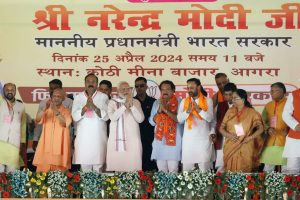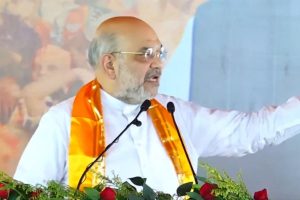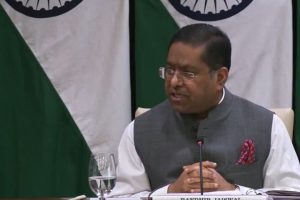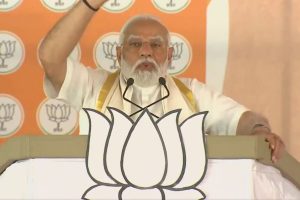One of the most remarkable additions to West Bengal’s cultural and archival cauldron is the recent opening of a beautifully curated and orchestrated digital archive of and on the works of poet-musician-lyricist-actor Kazi Nazrul Islam. The West Bengal Housing Infrastructure Development Corporation Limited the initiative to set up Nazrul Tirtha to provide an institutional set up to promote research and appreciation of life and works of revolutionary poet Kazi Nazrul Islam. The digitalised archive has been christened Muhafiz.
Popularly known as the Rebel Poet of Bengali literature and the “nightingale” of Bengali music, Kazi Nazrul Islam’s works reached beyond literature to touch political beliefs and ideologies so powerfully that he became an outstanding intellectual and poet between 1920 and 1942. His contribution to liberate modern Bengali poetry from the ‘prison’ of Rabindranath Tagore in the form of imitations is memorable. He was a passionate creator of letters written at different points of time to women he fell in love with. During his tenure as a soldier, he wrote a prose piece called Baunduler Atmakahini (Autobiography of a Vagabond) published in May 1919 and Mukti (Freedom), published in July the same year. He put together his experiences as a soldier in World War II, commencing from April 1920, in the shape of a novel later published in Moslem Bharat. The original documents are now lost.
His rebellious writings through every form of creative expression were vocal against all forms of oppression, bonding, communalism, feudalism and colonialism. This angered the then-British-ruled India so much that they not only banned many of his books but also put him behind bars. His contributions lay scattered, torn, lost and unpreserved so it must have been an extremely challenging task. But HIDCO Chief Debasis Sen with the guidance and support of the curator of Nazrul Tirtha Sri Anup Motilal took up the challenge. A tender was invited to invite willing archivists, collectors and other interested individuals in March 2017.
The Nazrul Digital Archive was inaugurated by urban development minister Firhad Hakim in the presence of members of the poet’s family and researchers on 20 December 2017. Arindam Saha Sardar is the archivist commissioned to research, put together the collection and assimilate the entire available and recoverable works of Nazrul and on Nazrul with the guidance and support of Sri Anup Motilal. All this has been carefully and painstakingly digitalized.
“I was already into field and documentary research on Kazi Nazrul Islam since 2014 because at that time, I was working towards making a documentary on this great poet. The film is on hold for want of funds. I personally visited collectors, family members, friends and Nazrul scholars to collect his music and songs that form the biggest slice of his works. Fortunately, I got hold of the first recorded song penned by Nazrul on 78 r.p.m. record sung by Harendranath Dutta. It was a political satire that went – jaater naamey bojjati shob khelche jua (they are gambling in the name of the nation and committing mischief). That record now is a part of this digital archive,” says Arindam Saha Sardar who is a noted digital archivist who lives in Uttarpara, a few kilometres away from Kolkata.
Saha Sardar says that during his research, he discovered that there were too many discrepancies and contradictions in the documents and books that carried information and education on Nazrul. “This led me to a deeper and more extensive search for his original documents such as manuscripts, song books, cinema booklets, and this went on for four years and it remains ongoing till this day. I can never claim that our research is complete” says Saha Sardar. Jagat Ghatak gave him the original notations of Nazrul’s song compositions. His brother Nitai Ghatak gave me a diary consisting of Nazrul’s songs written in his own hand. Dilip Roy (Junior), now 101, is the only person alive who learnt music directly from Nazrul and was the first publisher of Nazrul’s songs in book form. He gave Sardar that diary. Another person who pitched in to help was Dhiren Das. Sardar also managed to gather the song booklets of three films Nazrul was involved with – Dhruba, Vidyapati and Gora.
All the items were photographed, then digitalized to take the shape of a proper library archive collected from across Bangladesh and West Bengal. The collection includes 13 booklets of films in which Nazrul was directly involved as director, actor, lyricist, and music director such as Dhruba. The archivist also interviewed Arun Kumar Bose who wrote the first biography of Nazrul.
“I was helped in clearing the contradictions that confused by Brahmanand Tagore and old audio interviews were retrieved which helped resolve my confusion. We also restored his hold books and digitalized them. I interviewed the great musician Dipali Nag in 2009 when she was alive, not to forget an audiovisual interview of Juthika Roy in 2011. I also took the help of Nazrul scholar and researcher Rafiqul Islam, based in Bangladesh. I had the good fortune to interview Karunamoy Goswami, a scholar in Nazrul music and songs,” adds Saha Sardar. 800 manuscripts handwritten by Nazrul, 10 cinema booklets in original and three magazines he had edited are a part of the archive. Dipali Nag’s notebook that contains six Nazrul songs handwritten by Nazrul have also been included.
As many as 1200 Nazrul song compositions recorded and/composed by Nazrul between 1925 and 1950 have been restored by this young archivist. Included is an interview with Sudhin Das of Bangladesh taken in 2015 who is a music scholar and trainer in the music of Nazrul and Tagore. As many as 500 photographs collected from different sources, around 100 rare books on Nazrul that are now out-of-print, 35 books of notations published from Kolkata but now out-of-print, 500 songs sung by Nazrul himself have all been restored digitally. “We have digitalized a total of 25,000 pages by taking photographs with a high-end still camera and in some cases, we have used scanners. This resulted from visiting libraries, collectors and homes of people associated with Nazrul have made it possible to realise this dream project of Mamata Banerjee, CM, West Bengal.
An archive is defined as “a collection of historical documents or records providing information about a place, institution, or group of people.” Nazrul Tirtha from now on, is a living example of how researchers in music, poetry, lyrics, cinema, songs and drama can sit and home and conduct research from distant places by accessing this digitalized treasure on Nazrul and everything he stands for, for all time.











